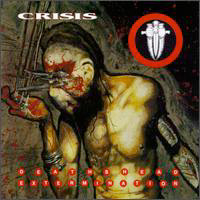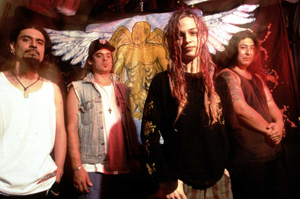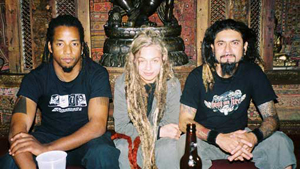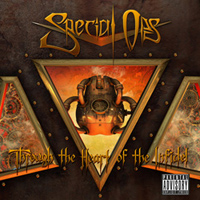 Crisis
Crisis
Deathshead Extermination (Metal Blade)
An interview with guitarist Afzaal Nasiruddeen
by Scott Hefflon
Half-crazed with insight and isolation, the siren screams at the turgid sea of metal. The sea, brackish and stale, is as slow to respond as red hot lava. The chilling of the atmosphere has reduced the once fiery sludge to tepid, watered-down swill, striving vainly to maintain fluid motion. The siren sits upon a solid outcropping of rock, oblivious to the stench of decay about her, tormented more by the images within, than by the tell-tale signs of another Ice Age without. The rock will weather the harsh elements, and the siren will scream until her dying day. As is her nature.
The good ship Metal Blade hears the song and responds, scooping up both siren and jagged rock formation (glistening with the many elements of precious metal, one must note). The ship’s, log chronicling the trip, is an audio recording called Deathshead Extermination. You can purchase a copy in fine stores March 26th.
 Why did you start the CD off with an instrumental?
Why did you start the CD off with an instrumental?
As a band, we are interested first and foremost in capturing a certain mood, a certain atmosphere. We felt that we needed to set a tone to the record; that’s why it’s called “Onslaught.” We also wanted people to realize that music comes first in this band. The visual aspects of the band, and the fact that there’s a girl in the band, are important issues; but the band stands very strongly on its musical roots.
I’m curious as to what “kind” of metal you’d call yourself?
I’d probably call it experimental metal, or something. I’m using the word “metal” because that’s the word everyone throws at us. I’d say it’s experimental metal with an experimental vocalist.
Experimental is a broad word, what specifically are your influences?
I’ll give a potpourri of influences from the band members. The bassist is from Taiwan, I’m from Pakistan, the singer is from Chicago, and the drummer is from Woodstock. We’re all living in New York City now. The drummer is the grandson of Fred Waring, the band conductor from the ’50s. The bassist is a classically-trained trombone player. He’s studied Stravinski, and is convinced that Stravinski is metal. Karyn had no background whatsoever in metal prior to three years ago. She’s since become an avid metalhead, but she was never exposed to it. She grew up on experimental industrial music, like Einstürzende Neubanten, and that’s where our tastes meet. Really way out sound music.
Did your traveling help broaden your musical influences?
I was in England from ’79-81 for the first wave of British heavy metal. I saw Iron Maiden, Motörhead, Diamondhead, and all those bands in small clubs before the movement really took off. This is before Bruce Dickinson and all that shit. When I came to America, I gave up on metal and began exploring other things. I was in Chicago and got really into early industrial. Not bands like Ministry; they have the same influences as I do. I’m talking about bands like Neubanten, early Cabaret Voltaire, early Swans… I also grew up listening to traditional Pakistani Sufi music, devotional music, which has suddenly become all the rage in the states. The Dead Man Walking soundtrack was done by a Pakistani master musician who also did the Last Temptation of Christ soundtrack with Peter Gabriel. One of his songs was used, or misused I should say, on the Natural Born Killers soundtrack by Trent Reznor.
 How’s the commercialization of your spiritual music make you feel?
How’s the commercialization of your spiritual music make you feel?
Not very good, obviously. He did a duet with Eddie Vedder for Dead Man Walking. I met him the December before last with my family in Pakistan, and while we all respect him dearly, I think he’s losing sight of what he’s doing. The commerciality of it has gone way, way beyond… He’s a learned man, a spiritual man. The music has a religious connotation, and that’s where I have a problem with Trent Reznor using it in a scene in which there are dozens of people being slain by machine-gun fire with devotional music playing in the background. It’s totally irresponsible. I would understand the juxtaposition if there was any kind of cultural connection. But you’re looking at pure Americana. I think the song was just used for contrast and shock value, which conceptually is OK, but this is my heritage. It’s inappropriate, it doesn’t fit. He’s a master musician who’s very highly respected in my country, but less so now. And even less so in the near future.
The music misses the message by making it commercially accessible?
It has no message, other than ambience.
Isn’t that degrading to the spiritual aspect of it?
Absolutely. 100%. It’s difficult for me to associate with certain aspects of it anymore, simply because it no longer gives me the same feeling. Sufi devotional music is supposed to bring you closer to God. It’s corrupted something very sacred.
 Making a leap here, how does your background translate into metal?
Making a leap here, how does your background translate into metal?
Yeah, we’re definitely talking tangents here… My upbringing, even in Pakistan as a kid, has been purely Western. I went to English schools, came from a somewhat privileged family, so I got Western education from the British. I’ve always had aggression and rage in me…
Is your rage against any one thing in particular?
In some ways, I guess it stems from being physically weaker than some males; I’m a small guy in a very macho society. I needed to vent my spleen, so to speak. My rage is definitely personal. I used to get my father to pick me up certain records when he was traveling around the world. At first it was Deep Purple, then it was Black Sabbath and Nazareth. When I went to England, I was always listening to extreme forms of music; more extreme than punk rock, that’s for sure. Motörhead, at the time, was probably the most extreme music. After their first record came out, they were the scariest thing people had ever seen.
What music do you listen to now?
I use different music for different moods. I listen to a lot of ambient: Scorn and Aphex Twin. I also like Melvins, Neurosis, EYEHATEGOD, StarkWeather… And I listen to a lot of devotional music, so my traditional music takes up a lot of my time, too.
What’s the connection between devotional music and metal?
The sort of metal I listen to also gives me some sort of spiritual health. It’s a calming influence for me. Sometimes I calm myself down with metal, sometimes I calm myself down with Sufi devotional music. Metal and hardcore are what I listen to to purge my negativity, to spew my bile. The amazing thing about Sufi music is the pure tonal succinctness which bypasses that negative emotional apparatus. Nusrat Ali Khan is in the world music section. He’s a 350 pound man/mountain, so you’ll know it’s him from the photographs. Just listen to his voice, you’ll understand. It’s transcendental. Metal is my transition to the transcendental



